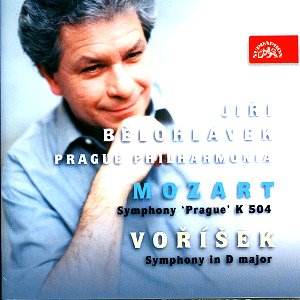Two
D Major symphonies with strong relevance to Prague, played by
possibly the most recently formed Czech orchestra, conducted by
a well known and respected conductor in a modern recording of
high quality. How does this issue match up against its competitors?
Supraphon
has been very cunning since as far as I am aware there is no identical
coupling. Indeed there are relatively few recordings available
of the Vorisek, which will probably be the more interesting part
of this disc. There is a performance on Hyperion by the Scottish
Chamber Orchestra under Mackerras, and a Tahra issue, with Karel
Ancerl and the Czech Philharmonic, recorded live. None of these
however, including this new one, can remove the effect of the
very early mono performance by the Prague Chamber Orchestra, which
used to be available on an old Supraphon vinyl. That had a spirit
about it, which was most engaging, and is missed by nearly all
later performances. When is Supraphon going to realize the treasures
it has in its old back catalogue?
Bĕlohlávek
has probably the finest recording, and his orchestra plays with
great spirit in both works. The Prague Philharmonia has been in
existence since 1994, was created specifically to play classical
works under their founder and chief conductor, Jiři Bĕlohlávek.
As Bĕlohlávek is also principal conductor of the Prague Radio
Symphony Orchestra, one wonders how close these two ensembles
are.
According
to the sleeve note, the Prague Philharmonia has released over
40 CDs for many major labels. I must confess that I have not seen
many, if any of them, and I would like to hear more work from
this ensemble.
The
Mozart, with which the disc starts is first rate with up to date
sound taken down in a very life-like acoustic and with playing
of great finesse and character. This three movement symphony,
premiered in Prague in 1786, was written as a result of an earlier
commission from Prague. The Marriage of Figaro had been given
its first performance in Prague some time before his visit to
the city, and due to its success, the composer was given a tremendous
welcome by audiences there. Mozart was commissioned to write another
opera; this was to become Don Giovanni. In addition he was given
the opportunity to stage a concert in Prague. It was at this that
the present symphony received its first performance.
Vorisek
considered Beethoven his guide, rather than Mozart. He had a short
life dying from tuberculosis at the very early age of 34. He was
court organist in Vienna and enjoyed a high reputation in that
city. His D major symphony is highly original and is the work
by which he is generally remembered. It is well structured, impeccably
scored, and to those, like me who enjoy Czech music is full of
those lovely rhythmic twists that the Czechs seem to do so well.
The performance is very good, although the conductor and orchestra
make a heavy weather of the delectable slow movement. The rest
of the symphony is played beautifully, and I wouldn’t let my comments
about the slow movement put you off, as it is a very minor concern.
A very enjoyable disc.
John
Phillips
